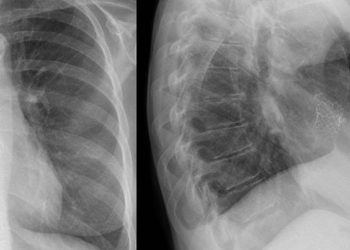Auditory-somatosensory stimulation may be effective to treat tinnitus
1. This double-blind, crossover, single-center randomized clinical trial found that Tinnitus Functional Index (TFI) and tinnitus loudness level scores were significantly decreased in those receiving bisensory stimulation.
Evidence Rating Level: 1 (Excellent)
Somatic tinnitus, which is tinnitus where the affected person can manipulate the volume, pitch, or tonal quality of their tinnitus by performing head or neck movements, comprises most cases of tinnitus. While the etiology of tinnitus is not fully understood, animal models have demonstrated the potential importance of dorsal cochlear nucleus circuitry changes in the development of this condition. A working hypothesis is that bisensory (including both auditory and somatosensory) stimuli can reverse altered neural patterns to reduce tinnitus, as demonstrated in a pilot study which saw tinnitus reduction in those who receiving bisensory stimulation. In this double-blinded, crossover, single-center randomized clinical trial, participants were randomized to receive 30 minutes per day of bisensory treatment (n = 49) or 30 minutes per day of auditory-only treatment (n = 50). Both groups were treated for 6 weeks followed by a 6-week washout phase. The TFI score was used as a primary measure for improvement in the groups (a higher TFI score indicates a higher effect of tinnitus on quality of life), and the Tinnitus Handicap Inventory (THI) was used as an endpoint measurement. While both the treatment and control groups saw improvements in TFI scores during the initial treatment phase, there was a significantly greater improvement in the bisensory treatment group (P < .01). The bisensory stimulation resulted in significant, cumulative, and lasting decreases in the primary endpoints of TFI score and tinnitus loudness level, as well as the end point of THI (Ps < .05). These clinically significant decreases in TFI score (> 13 points) and THI score (> 5 points) continued beyond treatment and into the washout phase. The results of this study corroborate and further bolster the results of the previous pilot study. The addition of 2 extra weeks of treatment in this study (6 weeks versus 4 weeks in the pilot study) lent itself to lasting results through the washout phase.
Click to read the study in JAMA Network Open
Image: PD
©2023 2 Minute Medicine, Inc. All rights reserved. No works may be reproduced without expressed written consent from 2 Minute Medicine, Inc. Inquire about licensing here. No article should be construed as medical advice and is not intended as such by the authors or by 2 Minute Medicine, Inc.






